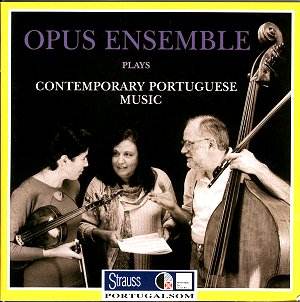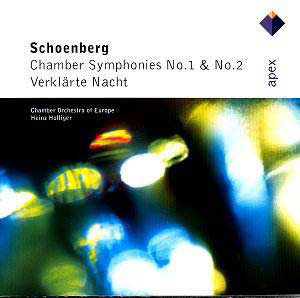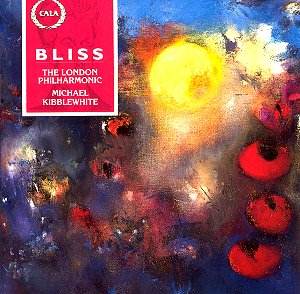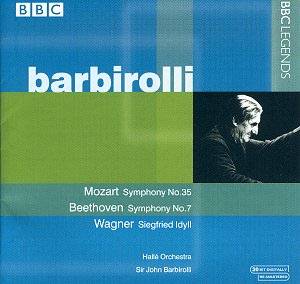 Composer: Antonio Victorino D’ALMEIDA (b. 1940), Alejandro Erlich OLIVA (b. 1948), Clotilde ROSA (b. 1930), Eurico CARRAPATOSA (b. 1962), Laurent FILIPE (b. 1962), Sergio AZEVEDO (b. 1968)
Composer: Antonio Victorino D’ALMEIDA (b. 1940), Alejandro Erlich OLIVA (b. 1948), Clotilde ROSA (b. 1930), Eurico CARRAPATOSA (b. 1962), Laurent FILIPE (b. 1962), Sergio AZEVEDO (b. 1968)
Works: Rock ‘n’ Roll Op. 108, Oito Estampas Portuguesas, Contornos, Sete Epigramas a Francisco de Lacerda, In Memoriam, Flow My Tears (by John Dowland, instrumentation by Azevedo), Ricordo
Performers: Opus Ensemble; Ana Bela Chaves (viola), Olga Prats (piano), Alejandro Erlich Oliva (double bass)
Recording: Recorded September and October 2000, Estudio Jorsom
Label: STRAUSS SP 4350 [57.58]
The Opus Ensemble’s latest recording presents a captivating exploration of contemporary Portuguese music that deftly intertwines the vividness of song with the somber threads of memory. Each piece on this disc, from D’Almeida’s invigorating “Rock ‘n’ Roll” to Azevedo’s poignant “Ricordo,” not only showcases the rich tapestry of Portugal’s musical landscape but also pays homage to the ensemble’s late oboist, Bruno Pizzamiglio. This historical context informs the emotional depth and resonance of the performances, as each composer navigates themes of life, death, and remembrance through their unique linguistic palette.
Antonio Victorino D’Almeida’s “Rock ‘n’ Roll” serves as a striking opener, encapsulating a lively neo-classical spirit within its brief five-minute duration. The piece artfully juxtaposes insistent rhythmic patterns with a vibrant melodic line, encapsulating a sense of hope and coherence even amid its lively groove. The ensemble’s precision and lively dynamic contrasts are particularly noteworthy; the bass, under Oliva’s accomplished fingers, alternates between arco and pizzicato, creating a foundation that is both energetic and buoyant. This interplay of textures sets a spirited tone, inviting listeners into a world where the echoes of the past intermingle with the vibrancy of modernity.
Alejandro Erlich Oliva’s “Oito Estampas Portuguesas” displays a remarkable sensitivity to the traditional melodies that comprise its essence. Through a skillful harmonization and an exploration of the trio medium, Oliva elevates these folk tunes into a rich tapestry of expression. The third song, “Vai-te embora, o papão,” exemplifies this brilliantly; the interplay of piano and strings creates an exhilarating dance, reflecting an intricate understanding of Portuguese musical idioms while maintaining a contemporary sensibility. The vibrant colors of Rosa’s “Contornos,” in contrast, reveal a deeply introspective side. The work ebbs and flows between reflective passages and moments of urgency, showcasing Rosa’s adeptness in navigating the emotional landscape of the ensemble’s unique instrumentation.
Eurico Carrapatoso’s “Sete Epigramas a Francisco de Lacerda” stands out for its seamless fusion of original melodies with Azorean folk songs. The contrasting tempos create a dialogue between the playful and the contemplative, where ostinati and melodic fragments weave together, forming a compelling narrative. This interplay not only highlights Carrapatoso’s inventive compositional style but also reinforces the ensemble’s technical prowess as they traverse these complex rhythmic terrains. Laurent Filipe’s “In Memoriam,” a tribute laden with emotional weight, begins with somber tones that gradually evolve into a vibrant tango. This transformative journey from despair to celebration is expertly navigated by the ensemble, who infuse each phrase with palpable intensity and clarity.
Sergio Azevedo’s “Ricordo,” drawing inspiration from Dowland’s “Flow My Tears,” culminates this album with a haunting depth, employing the trio’s full tonal palette to evoke a sense of longing and reflection. The recording quality throughout this disc is commendable, with a clarity that allows each instrument to resonate distinctly while enhancing the overall blend—particularly evident in the delicate interplay of high viola lines against the rich, throbbing bass. However, the abrupt edit at 4:36 in “Ricordo” disrupts the otherwise fluid experience, a minor blemish in an otherwise polished production.
This disc not only illuminates the vibrancy of contemporary Portuguese music but also serves as a poignant reminder of loss and remembrance. The Opus Ensemble’s performances are marked by precision, passion, and an unwavering commitment to the material, resulting in a recording that is both technically accomplished and emotionally resonant. Each piece is imbued with life, reflecting a commitment to the musical heritage of Portugal while simultaneously propelling it into the present. The combination of superb playing, thoughtful programming, and crisp sound engineering makes this release an essential addition to any serious collection of contemporary classical music.



